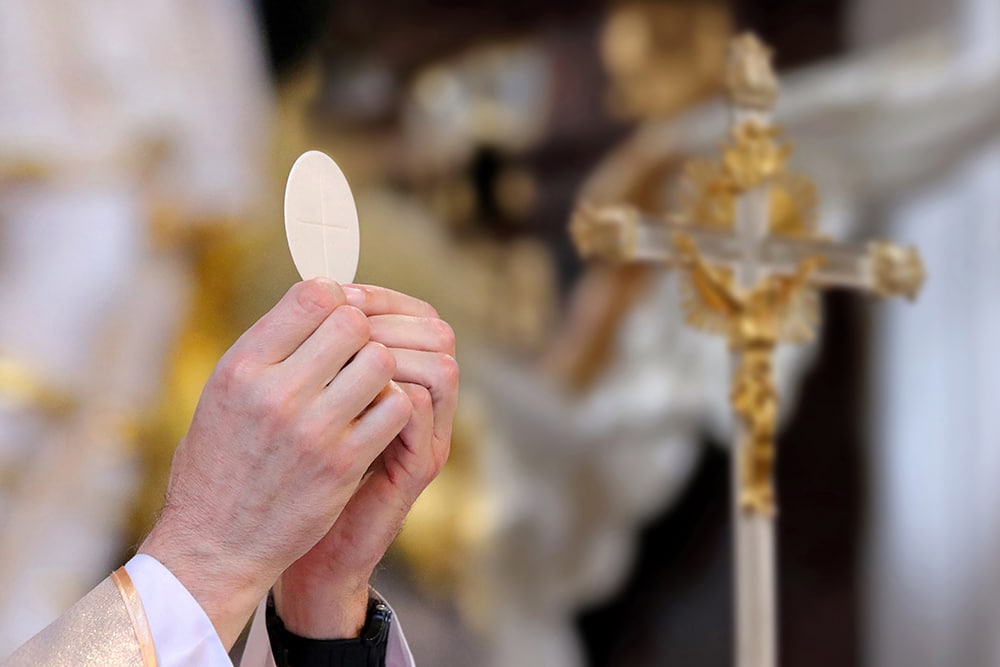
This polarization largely takes advantage of Pope Francis’ own words in Evangelii Gaudium (“The Joy of the Gospel”) where he writes, “The Eucharist, although it is the fullness of sacramental life, is not a prize for the perfect but a powerful medicine and nourishment for the weak. … Frequently, we act as arbiters of grace rather than its facilitators” (No. 47).
The Holy Father is absolutely correct. The Eucharist is not a prize. Strictly speaking, no one is worthy to receive Communion. We profess this at every Mass when we say, “Lord, I am not worthy that you should enter under my roof. …” It is absolutely, unequivocally unjust to deny anyone what Ignatius of Antioch called “the medicine of immortality.”
That said, the current debate over Eucharistic coherence is not really between those who view the Eucharist as medicine and those who view it as a prize. It is a disagreement about what sort of medicine the Eucharist really is — and what conditions allow a patient to benefit from the treatment.
I have been privileged to engage with many pastors and other prominent people of faith who either oppose or struggle with the idea of Eucharistic coherence. In these discussions, it has become clear that these good people tend to see the sacraments, in general, and the Eucharist, in particular, as palliative care. The world is harsh, cruel and cold. People are suffering real pain from the effects of sin, and it’s the Church’s job to provide comfort, to offer spiritual pain relief to help people cope. The Church is ultimately meant to give people a place where they can find shelter from the storms of life and experience the comfort of being in the Lord’s presence. To deny people who are hurting the medication that could ease their pain is the height of cruelty, is it not?
While I believe this argument is incomplete, it is not illegitimate. The sacraments are meant to facilitate an encounter with Christ that provides the peace the world cannot give (cf. Jn 14:27). That said, I hope we could all agree that the sacraments are meant to do more than provide comfort. Clearly, they are meant to provide a cure for the disease of sin.
In this sense, the sacraments are more like chemotherapy. When one has cancer, it is truly comforting to know that there is a treatment. But the treatment can be demanding, even difficult. It requires a lot from the patient. On difficult days, the patient may draw a great deal of comfort from knowing that the tumors are shrinking, but it doesn’t mean that the treatment can’t still be hard.
Sin isn’t just pain. It is a cancer that is killing every one of us — “the wages of sin is death” (Rom 6:23).
The call for Eucharistic coherence is not about denying pain medication to people who are suffering. It is an urgent call to prevent pastors from becoming little more than spiritual opioid pushers, keeping the souls in their care comfortably numb while allowing them to continue killing themselves however they please. When St. Paul says that those who receive Communion unworthily bring condemnation on themselves (cf. 1 Cor 11:29), he isn’t suggesting that God is interested in smiting people in the Communion line. He’s saying that using the “medicine of immorality” as merely palliative care for the pain of mortality offers a death sentence for the spiritual patient.
The call to Eucharistic coherence is simply a reminder that it is good to come for the comfort, but only if we’re willing to stay for the cure.
The Eucharist is medicine. The Church is a field hospital. But as we see in the actual field of physical medicine, it is all too easy to abuse medications, and hospitals can easily become little more than drug dens if the physicians who fill them don’t use medications as they were intended — that is, to treat disease rather than merely make people numb to the severity of their symptoms.
Despite much press to the contrary, the call for Eucharistic coherence does not undermine the idea that the Eucharist is medicine or that the Church is a field hospital. Rather, it ascertains that spiritual medicines are used according to their Maker’s directions and that the field hospital actually treats diseases as opposed to merely allowing people to kill themselves in comfort.
Dr. Greg Popcak is the director of CatholicCounselors.com.





